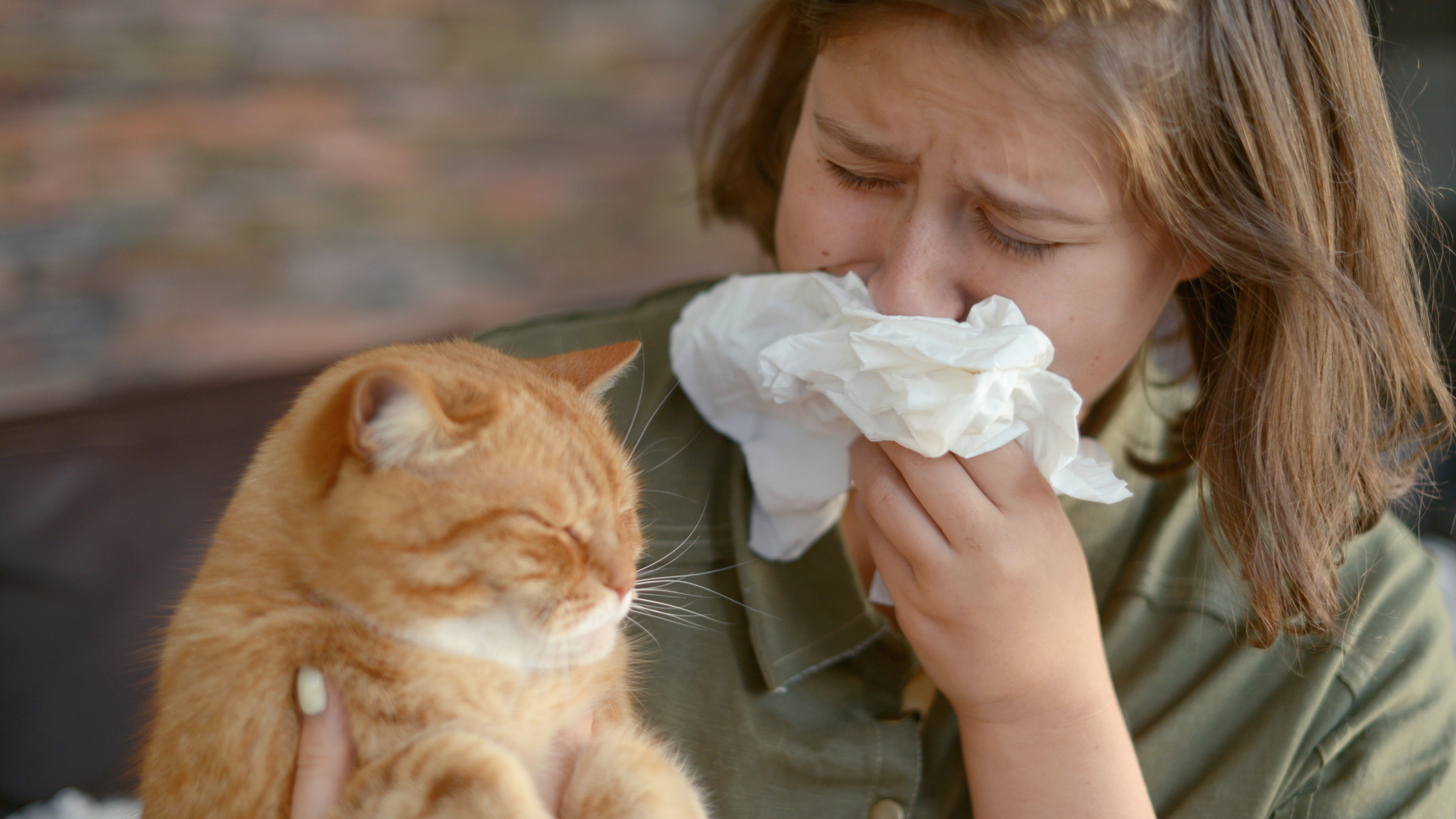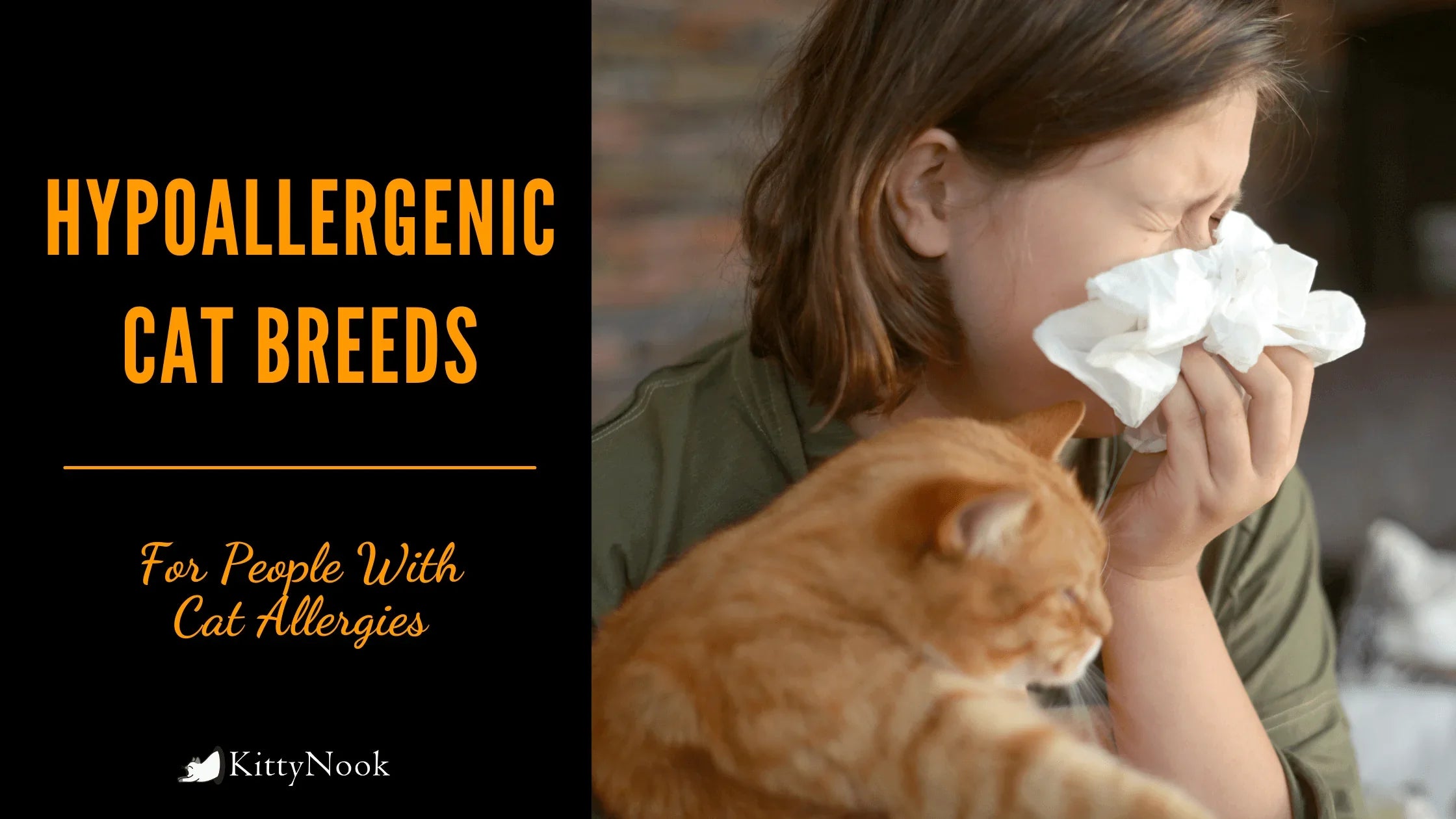Are allergies taking a toll on you? Does the consistent sneezing and itching hinder the affection you want to give to your cats? You're not the only one. People are twice as likely to have feline allergies than dog allergies. Still, furry felines are tough to resist.
If you're still yearning to have a pet cat, there are some "hypoallergenic" types known to generate fewer irritants than other pet cats. Remember, no breed is non-allergenic, yet these choices in breed may reduce negative responses.
What Triggers Your Allergies to Cats?

But what creates the allergies that you deal with? It's not the feline's fur. Many people who have cat allergies aren't allergic to a feline's fur but rather to proteins in cat saliva, pee, and dander (skin flakes). This protein is called Fel D1, which triggers you to have allergy symptoms like sneeze and itch. When a cat licks their hair, the allergen-laden saliva dries out and becomes airborne, increasing the probability of a reaction. Continually cleaning your home areas where your cat stays a lot of time can reduce several of these irritants.
7 Best Breeds for People With Allergic reactions

If you're a cat lover with moderate cat allergies, it still might be possible for you to have a cat in your house. Although no feline type is genuinely hypoallergenic, anecdotal reports assert that some breeds could be less likely to activate allergies. This may be because they create less of the Fel d 1 protein, a common allergen. The cat breeds that are supposedly less likely to trigger allergic reactions vary in look and temperament. Some are more common, while others are extra special. Furthermore, it is necessary to keep in mind that each feline within these breeds still could cause allergic reactions, as each cat will have slightly different allergens.
Some breed has less of this protein than others, making them suitable felines for people with allergic reactions. Aside from the Fel D1 protein, other variables affect a pet cat's irritant production:
Factors that Impact Allergen Production in Cats
- Males have more allergenic secretions than women
- Unneutered male cats generate greater than neutered males
- Dark cats tend to create more allergens than light ones (no one knows why)
- Kittens have fewer allergens than adults.
Suitable Cats for Allergic Individuals
Some breeds of cats generate fewer cat allergen and make pet parenting a little bit easier. But bear in mind that this "hypoallergenic" cat checklist must not be the only thing you think about when investigating which type of cat to take on.
The best way to know if you are perfect for a particular cat is to meet him or her. We suggest contacting a pet shelter or rescue team and setting up to meet the cat before deciding.
Oriental Shorthair
 They are thought to be non-allergenic felines. However, it's still a great practice to groom your Oriental regularly to keep dander to a minimum.
They are thought to be non-allergenic felines. However, it's still a great practice to groom your Oriental regularly to keep dander to a minimum.
The characteristics of the Oriental are as distinct as their coats. They are full of enthusiasm, creativity, and their love to be the focal point. They are complacent one minute animated and investigative the next. They are extremely curious and will undoubtedly go to excellent lengths to be involved in your tasks.
Balinese

Commonly referred to as the "longhaired Siamese," the Balinese resembles an unlikely prospect for a hypoallergenic cat breed. Despite its hair length, it is just one of the minority types that produce lower levels of Fel D1 protein compared to other cats, thus triggering fewer cat allergies. This caring and active cat are also known for being a low-shedder.
Balinese cats are intelligent, pleasant, and enjoyable to be about. Like the Siamese, they are recognized for their capacity to interact vocally. Balinese are very social, sensitive to your mood, and are more than willing to have some good chatter if you're feeling bleak.
Devon Rex

Of the two Rex pet cats, the Devon has both shorter and less fur. Your Devon Rex will certainly require to have her paw pads and ears cleaned up of oil build-up frequently, yet does not require regular full baths like the Sphynx or Cornish Rex.
Devons have been compared to fairies and space aliens for their big satellite-dish ears, huge, naughty 'window-to-the-soul' eyes, and aerial appearance. They have a reputation of cuddling up with their person during the night and wake them in the morning with purrs of affection. Given that the Devon sheds less than other breeds, you can snuggle back without worry of covering yourself in cat hair.
Cornish Rex

The Cornish Rex needs even more maintenance care than the Devon because they call for frequent baths to alleviate the oil accumulation on their skin.
Cornish Rexes are active, analytical, gazelle-like felines that have a lively temperament. Every little thing is a game to the Cornish Rex, and they can be tough to neglect when they remain in a friendly state of mind, which is most of the time. Rexes are determinedly outbound and caring towards their owners. With their warm suede feeling, they make the best wintertime lap warmer as well.
Both the Devon and also Cornish Rex can be the best cats for people with cat allergies. Pick one that matches your personality.
Siberian

Like the Balinese, the Siberian has a moderately long coat but still is hypoallergenic due to the lower enzyme levels in their saliva. Some claim that 75% of those with an allergic reaction to cats have none to the Siberian.
Siberians are affectionate cats with a great dose of playfulness. They are one of the few breeds that are attracted to water.
Siberians are intelligent, with the capability to problem-solve to get what they desire. Despite their size, they are agile and are excellent jumpers who can leap tall cabinets in a solitary bound.
Sphynx

The hairless Sphynx is the cat usually related to being a hypoallergenic breed. Being bald does not imply they're maintenance-free, though. Your Sphynx will need regular baths to remove the gummy accumulation of oils on her skin, and also, their big ears will certainly likewise require frequent cleanings.
According to the French breed criterion, the Sphynx personality traits are often compared to puppies based on their animated nature. To claim Sphynxes are vibrant is an understatement; they'll keep you amused carrying out aerialist tasks from the top of doorways as well as bookshelves.
Extremely dedicated and devoted, they follow their people about, wagging their tails and purring with love.
Javanese
Similar to the Balinese, the Javanese sports a medium-long layer that doesn't mat. Due to the absence of an undercoat, they have less fur, which equates to fewer allergens.
Javanese pet cats are intelligent and are recognized for their ability to communicate. They have a fascination with food and also often tend to burn off extra calories in spirited shenanigans. This breed is ideal if you desire a responsive cat that's very easy to train and likes showing love by purring in your ear and following you about.
Quick Tips for Brand-New Pet Parents

Adopting a "hypoallergenic" cat might not be a real magic bullet, but you can ideally unwind and also breathe a bit much easier. Attempt hanging out with a feline of the breed you want and see if your cat allergies stay in check.
Once you have a feline, there are steps you can take to lessen allergens whether you have a hypoallergenic type or not:
Regular Baths and Brushing: If you're allergic to felines, this task is best delegated to a groomer or member of the family. Research has proven that routinely bathing your pet cat can help eliminate up to 84% of existing allergens and decrease allergens' future manufacturing. Some also say that using distilled water in the bathroom might help in reducing irritant degrees.
Wash Cat Toys and Cat Bedding: Washing toys and beds also helps minimize the number of allergens drifting around your house. Do this once a week at the very least.
Note: While the types in this collection tend to be extra allergy-friendly, specific animals will undoubtedly vary. Please get in touch with the adoption shelter for details on a particular animal.





















